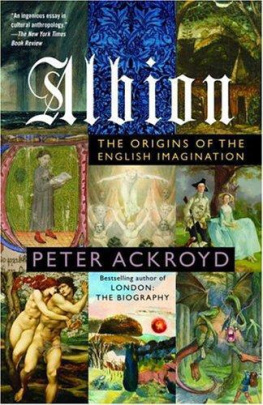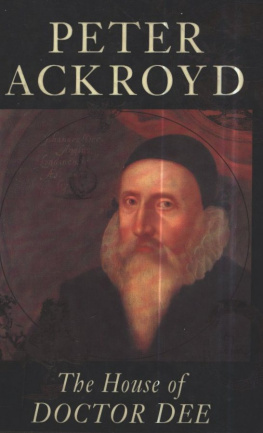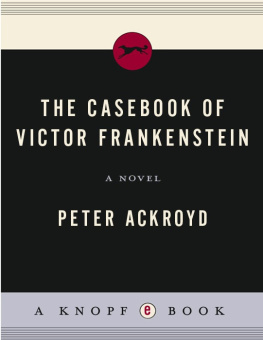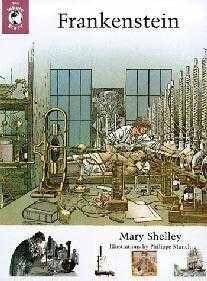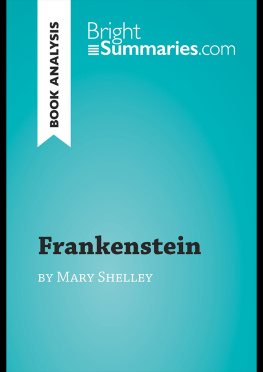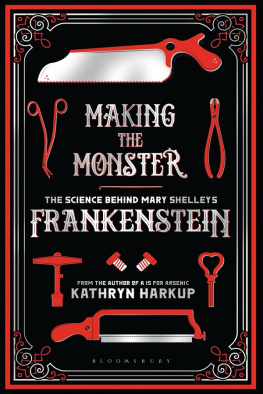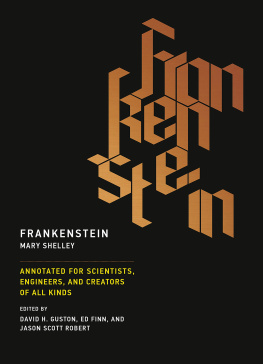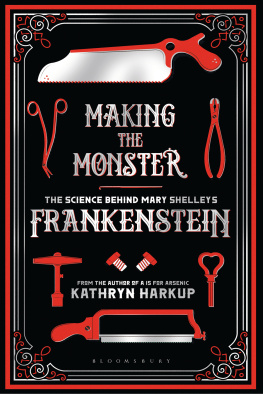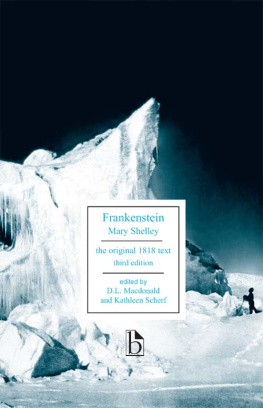
Peter Ackroyd
The Casebook of Victor Frankenstein
Copyright 2008 by Peter Ackroyd
I WAS BORN IN THE ALPINE REGION of Switzerland, my father owning much territory between Geneva and the village of Chamonix where my family resided. My earliest memories are of those glistening peaks, and I believe that my spirit of daring and ambition was bred directly from the vision of altitudes. I felt the power and grandeur of nature there. The ravines and the precipices, the smoking waterfalls and the raging torrents, had always the effect of sanctifying my life until one white and shining morning I felt compelled to cry out to the Maker of the Universe, God of the mountains and the glaciers, preserve me! I see, and feel, the solitude of your spirit among the ice and snow! As if in response to my voice I heard the cracking of the ice and thunder of an avalanche, on a distant peak, louder than the bells of the cathedral St.-Pierre in the narrow streets of old Geneva.
I exulted in storms. Nothing entranced me more than the roaring of the wind among the upright masses of rock, the crags and caverns of my native region; when the wind swept away the smoking mists, the woods of pine and oak were filled with its music. The clouds there seemed to haunt the upper air, wishing to touch the source of such beauty. In these moments my individual nature ebbed away. I felt as if I were dissolved into the surrounding universe, or as if that universe were absorbed into my being. Like the infant in the womb I was conscious of no distinction. It is the state that the poets wish to achieve, when all the manifestations of the world become blossoms upon one tree. Yet I had been blessed by the poetry of nature itself.
So in my earliest years my soul overflowed with ardent affections, and my wild and enthusiastic imagination was chastened only by my inclination towards study and mental industry. How I loved to learn! I imbibed knowledge as a sapling takes in water, never ceasing to grow upwards. The worst of my faults even then was ambition. I wished to know everything about the world and the great universe. Why was I born if not to learn? I dreamed of distant stars. In my imagination (and even then I believe that I understood the true meaning of that word) I saw beneath the crust the glowing core which caused the mountains all around me. I, Victor Frankenstein, would solve its mysteries! I would examine the beetle and the butterfly in my earnest wish to learn the secrets of nature. Desire and delight-as those secrets were unfolded to me-are among the earliest sensations I can remember. My father purchased for me a microscope through which I observed with indescribable interest the hidden existence of the world. Who does not wish to study the unseen and the unknown? The force instilled within the most minute organisms, making them move and meet, filled me with wonder.

AFTER MY SCHOOLING IN GENEVA, on the Calvinist pattern of industrious and patient study, my father sent me to the renowned university of Ingolstadt where I began my first enquiries into natural philosophy. Even then, I believe, I knew that I would carve my passage to greatness. Yet I had always wished to visit England, where the latest experiments in natural science were being performed by galvanists and biologists. It was a place of practical learning. My father did not believe that country to be favourable to the education of my morals, however, but after many earnest entreaties and urgent letters from Ingolstadt he finally relented. He gave me permission to enter the university of Oxford, in my eighteenth year, after many warnings on the laxity of English youth. I promised him that neither my virtue nor my character would be tainted in any respect. I spoke too soon.
It was at Oxford that I first met Bysshe. We both arrived at our college on the same day; confusing to a mere foreigner, it is called University College. My rooms were in the south-west corner of the courtyard known as the quad, and those of Bysshe were on the next staircase. I had seen him from my window and had been much struck by his long auburn locks, at a time when the style of hair was short. I am referring now to the very early years of this century. He had a rapid manner of walking, with long strides, but this was combined with a curious hesitancy as if he were not entirely sure of the destination he was pursuing with such ardour; he would sway slightly, guided by the wind. I saw him each morning in chapel, but we did not speak until we sat together during one of the lamentable dinners in hall. My impression of English cooking was much like my fathers view of English morals.
Bysshe was beside me, and I heard him speak approvingly to a companion about a Gothic tale written some years previously, The Fatal Ring by Isaac Crookenden.
Oh, no, I said. You must read the novels of Eisner for pure sensation.
Of course he noticed my accent at once. You admire the German tales of terror?
I do. But I am not a German. I am by birth a Genevese.
The nurse of liberty! Of Rousseau and Voltaire! Why, sir, have you come here to the home of tyranny and oppression? I had not heard such sentiments before, having been accustomed to think of England as the source of political freedoms, and Bysshe laughed at my expression of surprise. You have not lived among us for long, I take it?
I arrived last week. But I believed that the liberties of the people-
He put his hands up to his ears. I did not hear that. Take care. You will be accused of sedition. Of blasphemy. How much do you think that fine body of yours is worth?
I beg your pardon?
According to government, it is worth nothing. It can be removed with no apology and no explanation. We have repealed habeas corpus, you see. I was quite at a loss to understand him, but then immediately he changed the subject of conversation. Have you read The Buried Monk by Canaris? Now there is a tale of diablerie! I had read the book a month previously and, to my astonishment, Bysshe began to quote extempore the entire first paragraph beginning, There was never a peaceful hour in the monastery that, to the simple inhabitants of the region, was known as the place of echoes. He would have continued but his companion at dinner, whom I afterwards ascertained to be Thomas Hogg, begged him to stop.
Why do you call it government? Hogg asked him.
Why ever not?
Should it not be the government?
No. Government is more powerful and more insidious. Government is some abstract and overwhelming force. Government is absolute. Do you not agree, minister from Geneva?
Bysshe looked at me, keenly and curiously, and I replied as best I could. If I were a minister, I would tell you that God differs from the god.
He laughed out loud. Bravo! We will be friends. Permit me to introduce you to Shelley. He placed his hands upon his chest, and bowed. And Hogg.
My name is Victor Frankenstein.
A fine name. Victor is Roman, is it not? Victor ludorum and such like.
It is an old name in my family.
Frankenstein is more perplexing. You are not an Israelite, since you attend chapel. I had not expected him to notice me there. A stein is a jar for holding beer, I believe. Perhaps your ancestors were connected with the Frankish court in the honourable occupation of potters. You come from a family of makers, my dear Frankenstein. Your name is worthy of acclaim. By this time we had got up from the long table, and were walking back through the quad. I have wine, Bysshe said. Come and join us.
As soon as I entered his rooms, I knew that I was in the abode of an ardent spirit: on the floor, on the carpet, on the desk, on every available surface, lay a scattered profusion of objects of every description. There were papers, books, prints, and boxes innumerable with stockings, boots, shirts and other linen crammed among them. I observed that the carpet had already been stained and scorched in several places, which instinctively I ascribed to scientific experiment. He noticed my glance, and laughed. He had an immoderate laugh. Sal ammoniac, he said. Come and see my laboratory.
Next page

